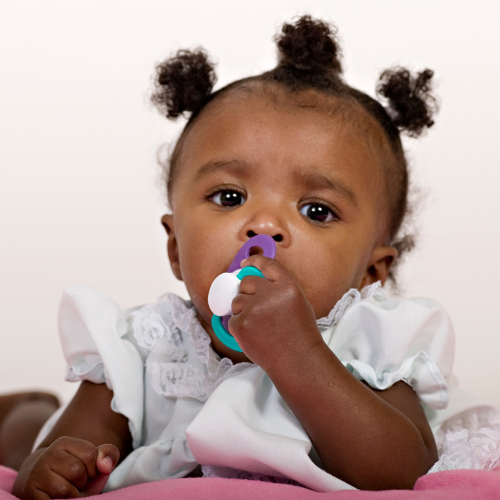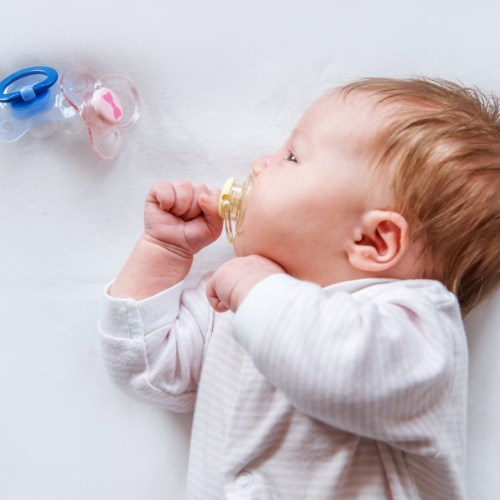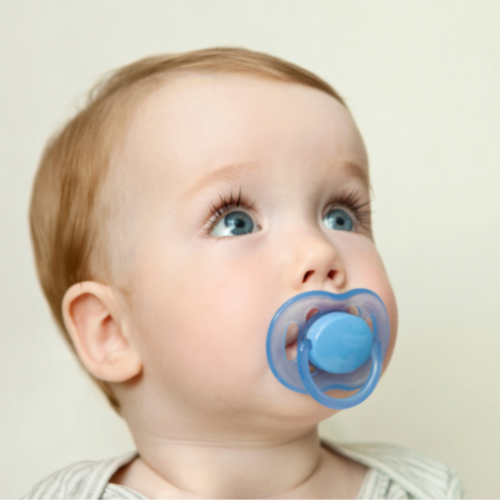For many families, their parenting journey often involves dummy use. Sometimes that dummy – or pacifier as it’s often known – use has advantages for the baby and their parents; sometimes it has disadvantages for everyone.
But is the dummy actually good for babies? Let’s discuss.
What is the best type of dummy?
This is all about trial and error, often in the same manner as trying to choose the best feeding bottles. Some babies will love one type of dummy and hate all others; and some babies will be fine with most dummy types. It’s worth trying a few different kinds until your baby finds the one they enjoy the most.
It’s also worth knowing that no matter what dummies you offer to your baby, they may refuse them all and simply don’t want a dummy. And that’s OK – my first two boys both rejected their dummies either after a few days or weeks, and we didn’t bother offering a dummy to our third boy.
Most dummies come with a silicone or rubber teat, and a plastic or silicone mouth shield and handle. The mouth shield prevents your baby from choking on the teat itself. Latex or rubber dummies are generally softer and more flexible than silicone, but they don’t last as long. Silicone dummies also may be easier to keep more free from germs than traditional latex dummies.
With regards to a question I get asked a lot: should babies use an orthodontic or flat dummy? An orthodontic dummy is flatter than traditional dummy teats, and are shaped to encourage your baby to suckle in a similar way to breastfeeding. They are also thought to potentially have less of an effect on how a baby’s first teeth develop.

Will using a dummy impact breastfed babies?
It can do for some mums and babies but it really depends on the baby and how well they also take to breastfeeding.
Certainly, it’s not advised for babies to use a pacifier before breastfeeding has been established, which is usually after 4 to 6 weeks.
Additionally, for mums who are struggling to establish breastfeeding – and by the way, it’s not as easy as often portrayed -, whilst it won’t necessarily stop the baby learning to breastfeed, it can become relied on too much when the baby should be learning to latch onto the breast instead.
Is a dummy safe for baby during sleep?
According to The Lullaby Trust, there is some research to suggest that the use of dummies, when used for putting a baby down to sleep, can reduce the risk of sudden infant death syndrome. The reasons though are unclear. Follow The Lullaby Trust for all safe sleep advice.
When can I give my baby a dummy?
Whilst there is no set age of when a dummy can be used, it is strongly recommended that dummies should not be used before breast feeding has been established, usually after 4 to 6 weeks.
The advice is also to wean your babies off the dummy between 6 and 12 months because of the disadvantages of pacifiers which we will go through later. However, this is much easier said than done!
What happens if the dummy keeps falling out the baby’s mouth?
One of the biggest downsides of dummies is that it will inevitably fall out of a baby’s mouth, and a baby won’t be able to put it back in themselves until around 9 or 10 months at least.
This can mean that if a baby is dependent on a dummy for getting back to sleep during the night, they will often wake up regularly looking for the dummy (sometimes as often as every sleep cycle) meaning very broken sleep for everyone.
When a child is able to replace the dummy on their own, it can often be very useful to put a few dummies in the cot so that even if one gets lost, there are others to choose from (though I do not advise on glow in the dark dummies as it can be too stimulating for sleep).

What are the practical tips for use of a dummy?
Here are some practical tips for everyday dummy use:
-
Firstly, regularly check the dummy to see if it’s worn, and replace with a new dummy when this is the case. A worn dummy can lead to loose bits and a hazard to children.
-
Sterilise your pacifiers regularly if your baby is under 12 months – as you can imagine, dummies pick up lots of germs which can increase risk to your baby’s health. You can sterilise using boiling water methods, a microwave sterliser or a bottle steriliser.
-
Try to avoid the use of the dummy around feeding times, especially if you are still establishing breastfeeding (though do try and wait to establish breastfeeding before introducing dummies).
-
Buy lots of spare dummies – you will lose them all of the time, they will need replacing regularly and you won’t want to be caught short if you are out and about and your baby is unhappy with their missing dummy!
-
As tempting as it may be, avoid dipping the dummy in sweet drinks or sweet foods as it is bad for their teeth and bodies with the increased sugar levels. It also won’t help with sleep.
-
Finally, don’t tie dummies around your child’s neck, wrist or arms as it’s a choking and strangulation hazard. If it falls out of their mouth, just help them replace it independently once they are old enough (from around 9 months or so).

What are the advantages of a baby using a dummy?
-
There is no doubt that there are some advantages of a baby using a dummy. It’s main advantage is that it’s great for helping the baby mimic those sucking instincts they need for feeding and soothing.
-
It’s also much easier to wean a baby off dummies than it is their own thumb, which is often the other thing that children tend to suck as a way to soothe themselves.
-
It will help soothe a baby who is upset or are in pain; for example, when they are having their vaccinations or they suffer from reflux.
-
As per The Lullaby Trust, and as mentioned above, there is evidence to suggest that it helps reduce the risk of sudden infant death syndrome (SIDS).
-
Because of how it can help soothe a baby, it can also help a baby fall asleep, especially if they are upset.
-
Dummies are very useful for premature babies as it can help them learn to suck ahead of the transition from tube feeding to breast or bottle feeding.
What are the disadvantages of dummy use?
-
The first disadvantage is often seen by many parents is actually an advantage, and that is the support it can provide a baby in falling asleep. Whilst that can often feel like a good thing, this often leads to bigger sleep problems further down the line. It’s only around 9-10+ months where a baby should be able to find the dummy in their cot and put it back in their mouth if it falls out. Up until this, if it falls out a baby’s mouth, parents are usually having to replace it, and if that’s happening multiple times per night, there is a lot of broken sleep for the entire family.
-
(It’s worth noting that whilst many parents suffer with these dummy “runs”, other parents aren’t having to replace the dummy multiple times a night. This can be down to how strong the baby’s dependency on the dummy is).
-
Another disadvantage of using dummies is that they might also trap germs and transport bacteria, which can increase the rate of infections, particularly acute otitis media, also known as middle ear infection.
-
It can lead to breastfeeding problems, especially in the first six months, if the baby is using the dummy regularly.
-
It can be very, very difficult to wean a child off the use of a dummy, even when they get to toddler age. In fact, it’s generally easier to remove it from babies even if there is the very initial upset.
-
Finally, dummies might also affect how baby teeth grow, and dummy use beyond the age of 4 or 5 can increases the chance of dental problems later in childhood.

How to settle baby without dummy?
When a baby has become accustomed to a pacifier, it is normally very difficult to remove it. It’s their “thing” to soothe themselves when in pain, when they are tired and it is often their aid to get to sleep. So taking this way can be a big challenge.
When it comes to sleep, I am quite binary in my advice – if you wish to keep it as a parent and it’s NOT a barrier to sleep, then you do you. However, if it is THE barrier to sleep, there is only one thing to do and that’s remove it in my view.
To do this usually requires sleep training because you need to help your baby learn to settle themselves to sleep without the use of the dummy. Very few babies would settle easily without the dummy immediately, and it can take a bit of time to overcome this challenge.
If you think your child’s pacifier use is detrimental to their – and your – sleep, then it might be time to look at some gentle sleep training. With my online sleep training course, you would have the structure, knowledge and support to break this habit in just a few days. Buy now to help everyone get that much-needed sleep!
If you feel like you would need a little more 1:1 support, have a look at our packages and book a FREE 15mins initial consultation to see if we can help you.



